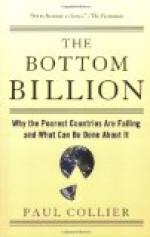MY WAGE
We may as well aim high as low, ask much as little. The world will not miss what it gives us, and our reward will largely be governed by our demands.
I bargained with Life for a penny,
And Life would pay no more,
However I begged at evening
When I counted my scanty store;
For Life is a just employer,
He gives you what you ask,
But once you have set the wages,
Why, you must bear the task.
I worked for a menial’s hire,
Only to learn, dismayed,
That any wage I had asked of Life,
Life would have paid.
Jessie B. Rittenhouse.
From “The Door of Dreams.”
THE GIFT
“Trust thyself,” says Emerson; “every heart vibrates to that iron string.” This is wholesome and inspiring advice, but there is, as always, another side to the question. Many a man falls into absurdities and mistakes because he cannot get outside of himself and look at himself from other people’s eyes. We should cultivate the ability to see everything, including ourselves, from more than one standpoint.
O wad some Pow’r the giftie gie
us
To see oursels as ithers see
us!
It wad frae mony a blunder free us,
And foolish notion;
What airs in dress an’ gait wad
lea’e us,
And ev’n devotion!
Robert Burns.
PROMETHEUS UNBOUND
In the poem from which this excerpt is taken, Prometheus the Titan has been cruelly tortured for opposing the malignant will of Jupiter. In the end Prometheus wins a complete outward victory. Better still, by his steadfastness and high purpose he has won a great inward triumph. The spirit that has actuated him and the nature of his achievement are expressed in the following lines.
To suffer woes which Hope thinks infinite;
To forgive wrongs darker than death or
night;
To defy Power, which seems
omnipotent;
To love, and bear; to hope till Hope creates
From its own wreck the thing it contemplates;
Neither to change, nor falter,
nor repent;
This, like thy glory, Titan, is to be
Good, great and joyous, beautiful and
free;
This is alone Life, Joy, Empire, and Victory.
Percy Bysshe Shelley.
VICTORY IN DEFEAT
The great, radiant souls of earth—the Davids, the Shakespeares, the Lincolns—know grief and affliction as well as joy and triumph. But adversity is never to them mere adversity; it
“Doth suffer a sea-change
Into something rich and strange”;
and in the crucible of character their suffering itself is transmuted into song.




